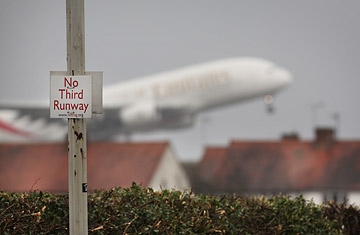
A passenger jet takes off from Heathrow airport near the village of Sipson, west of London, England.
In the unassuming village of Sipson, England, all roads lead to the King William IV pub — a late 15th century tavern known for its cask ale and the ceaseless chatter of good-humored barflies. On Thursday afternoon, however, the lager and the laughter stopped flowing. Forty villagers watched the television mounted in the bar silently as Geoff Hoon, the nation's Transport Secretary, announced that he had approved plans for a third runway at London's Heathrow Airport. For Sipson, which sits on the airport's northern perimeter, it's nothing short of annihilation: the village's 700 homes and businesses must now be razed to make way for 7,200 feet of tarmac.
Thursday's decision has thrust Sipson into the frontline of the epic fight between economic development and environmental concerns, which is intensifying as the global economy stutters. Across the world, politicians are asking themselves how best to balance their green agendas against their struggles to stimulate growth. Such questions are anything but abstract for Sipson's elderly residents, many of whom have spent their entire lives in the village. "I got married in the local church. My children were born here. Our family home is here," says Linda McCutcheon, a 63-year old pensioner who has lived in the village for 42 years. "All of my family history will be buried under concrete." As part of the tentative plans for expansion, a four-lane highway will cut across the village's Cherry Lane cemetery. "I've already pre-paid to rest there with my father and mother," says Sylvia Steadman, 66. "It's extremely upsetting." (See pictures from the village of Sipson.)
Proponents of the third runway justify such sacrifices in the name of competitiveness: Heathrow, Europe's busiest airport, attracted around 67 million passengers last year. That's down 1.4% since 2007 and is expected to fall further this year, but Future Heathrow, a coalition of businesses and trade unions with interests in the aviation community, says additional capacity will be needed further down the line. "The U.K. needs to fight in the global market like any other country, and that market has gotten a lot tougher recently," says Baroness Jo Valentine, the chief executive of London First, a lobby group that campaigns for investment in London. Other advocates point out that the $13 billion expansion is vital to help Heathrow stay ahead of rival hubs in Paris, Frankfurt and Madrid, and that it will create 65,000 new jobs.
But the promise of jobs doesn't console Chrissy Schilling, a sixty-something educational psychologist and member of Sipson's No Third Runway Action Group (NOTRAG). "I'll be living on a construction site with the additional horror that a Spanish construction company will be bulldozing an English community," she says. "It's evil." Grupo Ferrovial, a Spanish builder, controls BAA, the body that owns Heathrow.
Environmental campaigners, including the pressure group Greenpeace, have teamed up with NOTRAG to fight the project, which they view as a slap in the face from a government that has promised to reduce overall carbon emissions by 80% by 2050 and pledged to invest in eco-friendly projects that promote electric cars and wind power. "On the one hand we lead the world with the pioneering legislation," says Leo Murray of the anti-expansion group Plane Stupid. "But in the very same breath we've just implemented a policy which will make it impossible for us to meet the target." Earlier this week, Greenpeace purchased a plot of land half the size of a soccer field on the proposed building site, which it says it won't sell in an effort to delay the village's demolition. Emma Thompson, the Oscar-winning actress, was among several celebrities who helped purchase the land. "I don't understand," she said, "how any government remotely serious about committing to reversing climate change can even consider these ridiculous plans."
Britain's ruling Labour party now faces a backlash within its own ranks: more than 50 Labour MPs oppose the expansion, which they see as irreconcilable with their environmental pledges. On Thursday, John McDonnell, the MP who represents Sipson, was ejected from Parliament and banned for five days after grabbing the mace — a 5-foot long ornamental key and a symbol of Parliamentary Authority — and shouting, "It's a disgrace to the democracy of this country!"
The two main opposition parties, the Conservatives and the Liberal Democrats, have both pledged to scrap the scheme if they wrest power from Labour. Boris Johnson, London's Conservative mayor, is an enthusiastic proponent of an alternative plan to build a brand new airport in the Thames estuary. He describes the decision to greenlight Heathrow's expansion as "pure political machismo." (See pictures of Boris Johnson.)
"Here is a tottering, decaying government pretending it still has some political virility left in it," he says.
That's a typically Johnsonian exaggeration. The Prime Minister has gained international kudos from his quick action to recapitalize British banks, which was copied around the world. But Labour is trailing the Conservatives in the polls and opposition to the third runway may further undermine support for the government. For the villagers of Sipson, a Labour defeat at elections due by spring 2010 could yet save their homes since construction work isn't due to begin for at least five years. Still, nobody is banking on that outcome. Sheila Taylor, a pensioner who moved there in the 1930s, finds a very British way to look on the bright side. "I'll probably be gone by the time they start building," says the 77-year-old. "In a way, I hope that I am."
